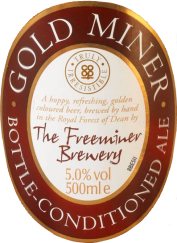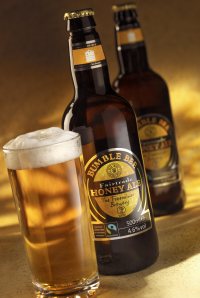 |
 |
|

|
|

|
 |
home
about
features
A-Z
books
|
|
Protz:
features
reviews
tastings
news & events
books
|

| |
Freeminer refreshes
by Willard Clarke, 01/09
Don Burgess (right) has a refreshing outlook on life: "I live to brew beer, not to make money". He turns a penny or two, of course, but his main motivation is to produce beers that not only provide pleasure and refreshment for drinkers but also put something back into the community.
He runs the Freeminer Brewery in the Forest of Dean in Gloucestershire. It's a remote, mysterious and little-known area of England that covers 110 square kilometres of forest between the Severn and Wye rivers, close to the Welsh border. It's been mined for ore and coal since Roman times: the term freeminer refers to a medieval right that allowed men born within the ancient "hundred" or district of St Briavels to earn a living as a miner.
|
|

|
The mines are long gone and grassed over. The forest is now a tourist area - but watch out for wild boar -- and, on a small industrial estate close to Cinderford, Don Burgess works his magic with malt and hops. It's a special kind of magic, for though you will find his cask beers on sale in pubs in Gloucestershire and in some Wetherspoon's outlets, 90 per cent of his production is in bottle.
"Twelve years ago I saw that bottled beer was the future for a brewer of my size," Don says. "I thought the emergence of the pubcos would squeeze out small brewers and I needed a new route to market."
|
|
The new route was the Co-op. The national retail chain was also looking for a new route to market. Unwilling to take on the likes of Sainsbury's and Tesco, the Co-op downsized to smaller shops and is doing well as a result. The group is concerned with ethical trading and is keen on organic and Fairtrade goods. As a result, the Co-op's beer buyers found a kindred spirit in Don Burgess.
"The Co-op likes and respects what I do," he says. He brews an Organic Premium Ale (5%) for the group that uses Fairtrade Demerara sugar from a farmer's co-operative in Malawi, and Bumblebee, a 4.6% honey beer with Chilean wild flower Fairtrade honey. His Harvest Ale (4.8%) uses malting barley grown by the Co-op: it surprises many people to learn that the Co-op is Britain's biggest farmer.
|
But far and away his biggest brand for the Co-op is the bottle-conditioned Gold Miner (5%). It uses Optic pale malt from the specialist Warminster Maltings in Wiltshire, a dab of crystal malt, and First Gold hops. It has a big resinous hop, sappy malt and citrus fruit aroma, while bitter hops dominate the palate. The finish is dry, hoppy and bitter, with juicy malt and tangy fruit.
Don has branched out and now produces a bottle-conditioned beer for Morrison's called simply The Best (6%). It has a complex hop recipe of First Gold, Fuggles and Goldings and uses six different malts. The result is an amber/russet beer booming with peppery hops and rich malt, with a long, dry and bitter finish.
|
|

|
He produces 600 barrels a month on plant bought from the former Hull Brewery. It's a conventional British craft kit: mash tun, copper and whirlpool, with three fermenters inside the building and bigger ones outside. The success of Freeminer means a move to larger premises is an urgent consideration.
Don comes from a Forest of Dean family that includes miners and publicans in its ranks. He took a degree in micro-biology at Manchester and first brewed with the West Coast Brewery in Chorlton, owned by Brendan Dobbin.
"It was a string and sealing wax operation," Don recalls. "I don't how we got beer out of the place and Brendan was often away, building small breweries for other people. On the day I joined, Brendan said he would have to leave me to it for a few days while hed wsent off to build a brewery. When I protested that I'd never brewed commercially in my life, Brendan said: 'But you've a got a degree - you're better than me at brewing' and left me to it."

|
|
When a serious fire damaged the brewery, Don moved back to his home turf and worked for a while with Paul Soden at the Jolly Roger Brewery in Worcester while he planned Freeminer. He opened on Trafalgar Day in 1991 and called his first beer Trafalgar, named after a mine in the forest rather than the battle. The beers that followed were also named with pride after local mines: Waterloo, Speculation and Strip-and-at-It. The last named recalled the way miners stripped down to their leather trousers before going underground.
As a result of a cash crisis in 2006, Freeminer is now owned by Peter Thomas. He is ex-Guinness and looks after marketing and bottle design: beers are bottled by Meantime and Marston's and distributed by Marston's.
But Don remains firmly in charge of brewing, producing beers that use the finest raw materials and make a small but welcome contribution to saving the planet.
|
|
|
home
about
features
A-Z
books
|